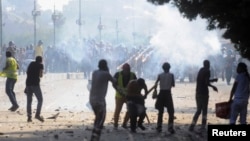Deadly clashes in Egypt have continued Tuesday, despite a plea from the country's interim president urging people to remain calm and abstain from violence.
Health ministry officials said the clashes Tuesday near a sit-in by supporters of ousted President Mohamed Morsi at Cairo University left at least six people dead and 33 others injured.
At least four people died Monday in fighting between supporters and opponents of Morsi.
Interim President Adly Mansour went on state television late Monday to tell Egyptians that reconciliation is necessary for the country to move forward.
Sectarian violence
Meanwhile, Human Rights Watch is urging the Egyptian government to prioritize ending sectarian violence, highlighting attacks against Christians in the weeks since Morsi's ouster.
The group said Tuesday authorities should urgently investigate those incidents, and that religious and political leaders should "denounce the dangerous escalation of sectarian attacks."
Morsi's family has spoken out against Egypt's military, accusing it of kidnapping him. The former president's son, Osama Morsi, threatened to use legal measures to gain his father's release.
At a news conference Monday in Cairo, Osama Morsi said the family has not seen their father since July 3 when Egypt's military overthrew Morsi's democratically elected government.
Military officials say they have detained Morsi for his own protection and that he is in good health.
Morsi's Muslim Brotherhood has been holding near daily demonstrations in Cairo and across the country, demanding his release and reinstatement. He had served only one year of his term as Egypt's first democratically elected president following the removal of longtime leader Hosni Mubarak in 2011.
Health ministry officials said the clashes Tuesday near a sit-in by supporters of ousted President Mohamed Morsi at Cairo University left at least six people dead and 33 others injured.
At least four people died Monday in fighting between supporters and opponents of Morsi.
Interim President Adly Mansour went on state television late Monday to tell Egyptians that reconciliation is necessary for the country to move forward.
Sectarian violence
Meanwhile, Human Rights Watch is urging the Egyptian government to prioritize ending sectarian violence, highlighting attacks against Christians in the weeks since Morsi's ouster.
The group said Tuesday authorities should urgently investigate those incidents, and that religious and political leaders should "denounce the dangerous escalation of sectarian attacks."
Morsi's family has spoken out against Egypt's military, accusing it of kidnapping him. The former president's son, Osama Morsi, threatened to use legal measures to gain his father's release.
At a news conference Monday in Cairo, Osama Morsi said the family has not seen their father since July 3 when Egypt's military overthrew Morsi's democratically elected government.
Military officials say they have detained Morsi for his own protection and that he is in good health.
Morsi's Muslim Brotherhood has been holding near daily demonstrations in Cairo and across the country, demanding his release and reinstatement. He had served only one year of his term as Egypt's first democratically elected president following the removal of longtime leader Hosni Mubarak in 2011.





